Features
ENDING THE FIRST YEAR WITH A BANG! – Part 7
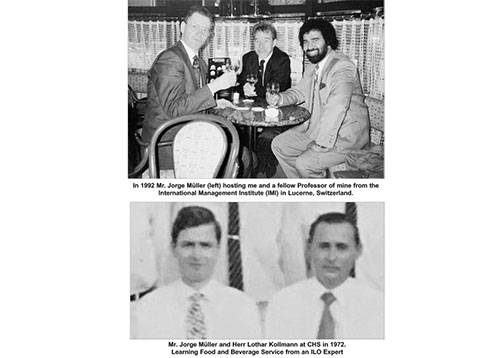
CONFESSIONS OF A GLOBAL GYPSY
By Dr. Chandana (Chandi) Jayawardena DPhil
President – Chandi J. Associates Inc. Consulting, Canada
Founder & Administrator – Global Hospitality Forum
chandij@sympatico.ca
Orders by Herr Kollmann
In the early 1970s one of the Expert Lecturers in Restaurant and Bar Service at the Ceylon Hotel School (CHS) was Herr Lothar Kollmann.. He dressed well with white shirts that were fashionably embroidered with a small Black (Schwartze) Rose. As a young man in his late teens, he had served in the German army during the World War II. He had lost two fingers in his right hand, due to a pre-mature grenade explosion. He often came to our class and said, “I need five volunteers”, showing the three remaining fingers from his right hand and two fingers from his left hand. This confused us. As this was for extra hard work, we never wanted to volunteer. Therefore, we would look down to avoid eye contact. Annoyed with this reaction, on one occasion, he waited for one minute and then turned red in anger. He pointed his index finger and ordered, “You, you and three of you, Kommen Sie, NOW!” We quickly marched behind him, obediently.
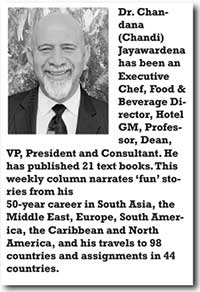 On another occasion when a group of students were relaxing during our 10:00 AM tea break, he came to us and asked, “Who has a licence to drive?” A third-year student, Walter Perumal, stood with his arm up and proudly announced, “Me, sir. I do”. Walter was anticipating an opportunity to drive the new van of CHS. Herr Kollmann grinned and said, “OK, Walter. Excellent. Now drive this tea trolley back to the kitchen and wash all these dirty tea cups.” That was the last time Walter volunteered for anything until he graduated from CHS.
On another occasion when a group of students were relaxing during our 10:00 AM tea break, he came to us and asked, “Who has a licence to drive?” A third-year student, Walter Perumal, stood with his arm up and proudly announced, “Me, sir. I do”. Walter was anticipating an opportunity to drive the new van of CHS. Herr Kollmann grinned and said, “OK, Walter. Excellent. Now drive this tea trolley back to the kitchen and wash all these dirty tea cups.” That was the last time Walter volunteered for anything until he graduated from CHS.
Missing Cigarettes
Herr Kollmann smoked Rothmans Cigarettes imported from the UK, while students shared locally made much cheaper Bristol Cigarettes. One day we managed to hide his packet of cigarettes, but wondered why he never commented about it. Later we enjoyed smoking his Rothmans after we returned to the CHS hostel. Over thirty years later Herr Kollmann was invited by one my batch mates, Chris Isaac, to dinner at his home in Germany. When he noticed that Herr Kollmann had forgotten to bring his Rothmans, Chris had offered a cigarette to him. Herr Kollmann lit one cigarette and proceeded to put the whole packet of Rothmans into his coat pocket. He then stated, “Isaac, we are now quits!”
CHS focussed a lot in teaching us food production and service. It was able to recruit several expatriate experts with the generous funding from the Carl Duisberg Society and the West German Government. In addition, CHS was fortunate to obtain help from the International Labour Organization (ILO), an agency of the United Nations. The Food and Beverage Service training provided to us by a Swiss national, Mr. Jorge Müller, an ILO expert Maître d’hôtel was very popular. Mr. Müller was a very friendly person and loved to see his students progress in their careers. The ‘hands on’ basics in food and beverage service skills I learnt from Mr. Müller laid a strong foundation for my early career in hotel operations.
Nineteen years later, Mr. Jorge Müller and I became work colleagues. In 1990 we both worked for Schiller International University (SIU) Hotel Schools. He lectu

red at the SIU Hotel School on the Engelberg campus in Switzerland. I ran the SIU Hotel School on the London campus in the UK, as the Acting Director. We became good friends. Every time I went to Switzerland to teach hotel management as a Visiting Professor of the International Management Institute (IMI) in Lucerne, he hosted me to dinner.
I founded the International Hotel School (IHS) of Sri Lanka as the Managing Director, 30 years ago at the Mount Lavinia Hotel. I recruited a few former CHS personalities to assist me in establishing IHS. They included Mr. Eardley Edrisinha (our Vice Principal at CHS in the 1970s) as the Principal, Mr. Jorge Müller as an Adviser and a CHS graduate senior to me, Mr. Kamal Happuwatte (later the Principal of CHS) as the Curriculum Development Consultant. By then I had learnt that for any project to be successful, a leader must wisely surround him/herself with people better than him/herself. IHS will celebrate its 30th anniversary as the second oldest hotel school in Sri Lanka in September 2021.
Learning to Plan Hospitality Events
We learnt a few basic steps in event planning when we were involved in organizing a holiday party at the Ceylon Hotel School (CHS). That event was a success, so some of us continued looking for an opportunity to practice our newly acquired skills in event planning. The idea of celebrating the graduation of the third-year diploma students came up during a booze party at the CHS hostel. Our temporary “Dutch courage” made us ambitiously innovative in our suggestions. After the student representatives presented the concept of a Graduation Ball dinner dance open to public, the Principal and the teaching staff decided to support this idea. The leadership of the event was entrusted to the second-year students. As the first-year students, my batchmates were grouped into various sub committees to support the event.
The top venues for dinner dances in Sri Lanka at that time were three well-reputed hotels established in the 1860s – Galle Face Hotel, Mount Lavinia Hotel and the Grand Oriental Hotel (later Taprobane). These hotels were too expensive for us. Therefore, after we raised a small amount of funds through dance souvenir advertisements, we settled for the relatively inexpensive Samudra Hotel as the venue for the CHS Graduation Ball in 1972. The students did most of the work to organise a memorable event. We managed to raise sufficient f

unds to hire one of the most popular dance bands in Sri Lanka at that time – Gabo & the Breakaways. My good friend, lawyer-turned-musician, Sohan Weerasinghe, was their lead singer.
First-ever CHS Graduation Ball in 1972
In preparing for the big day, some of my batchmates learnt ballroom dancing and practiced at the hostel using broom sticks as phantom dance partners! Apart from learning ballroom dancing, one of the biggest challenges we had was finding actual dance partners. I was pleasantly surprised to be invited to join the table of one of our German-trained lecturers, Mr. Rohan Dias Abeysinghe. Knowing that his beautiful younger sister was attending the dance, I had some hope of partnering her. That plan did not materialise, as her brother was over-protective of her.
My other choice was a British teenage girl staying with her parents at Samudra Hotel. Unfortunately, a handsome CHS graduate who was two-years senior to me, acted promptly to book that girl as his partner. I was still not out of luck, as I finally found an Australian teenage girl holidaying in Sri Lanka, who became my partner. I liked the hot pants she wore to the dance. These were fashionable in the Western countries, but shockingly new to Sri Lanka at that time. With that trendy and groovy attire, my last-minute dance partner quickly became the talk of the event. A few of my poor batchmates who could not find dance partners were hoping to get an opportunity to dance with her, if and when I took a b

reak from dancing. I selfishly blocked any such partner-sharing arrangements by simply dancing non-stop with my partner. We nearly won the Baila dance competition held at the end around 5:00 am.
The first CHS Graduation Ball was a great success and we had lots of fun. We also made substantial profits. This tradition that we initiated has now continued with 25 more CHS Graduation Ball dinner dances held during the last 49 years. This event was rebranded as ‘Gravitas’ since the year 2009, to attract non-CHS hospitality professionals. It is now considered the most popular and prestigious event in the social calendars of the Sri Lankan hospitality industry management professionals. Not bad for an event wit
h a humble beginning that evolved during a student booze party at the CHS hostel in 1972.
The Worst in Class
Soon after the graduation and dance events were over, I received the bad news on the last day of our first year at CHS. I have placed last out of 28 students in my batch during the final examinations of year one. Unlike now, at that time the common practice was to publicly announce class overall positions and display final results on school notice boards. That 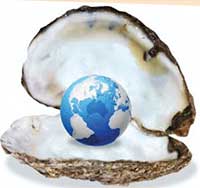 was a humiliating practice, especially for the person coming last in class! As I was the only student in my batch who did not study at all, my batch mates were not surprised about my poor performance at the year-end examinations. I was too scared to go home for the summer vacation with my report card. When I finally went home, I was happy to hear that my father was away on some government business. My mother wanted to see my report and I told her a white lie, “CHS will send it by mail”. I had some breathing space which I used to hang out with my neighbourhood buddies. However, I felt like a ‘crab in boiling water.’
was a humiliating practice, especially for the person coming last in class! As I was the only student in my batch who did not study at all, my batch mates were not surprised about my poor performance at the year-end examinations. I was too scared to go home for the summer vacation with my report card. When I finally went home, I was happy to hear that my father was away on some government business. My mother wanted to see my report and I told her a white lie, “CHS will send it by mail”. I had some breathing space which I used to hang out with my neighbourhood buddies. However, I felt like a ‘crab in boiling water.’
When my father returned from his trip, he opened the mail and there was an envelope with the CHS logo on it. The letter was from the CHS Principal, Herr Reinhold Sterner, and addressed to my father. The letter referred to my report card, which my father had not seen yet. The letter ended with a forceful paragraph which read, “Do yourself, your family, your son, this school, and the hotel industry of Sri Lanka, a big favour by removing Chandana Jayawardena from the Ceylon Hotel School immediately. He will not succeed in a profession such as hotel-keeping, which requires hard work, commitment and discipline.”
Features
Following the Money: Tourism’s revenue crisis behind the arrival numbers – PART II
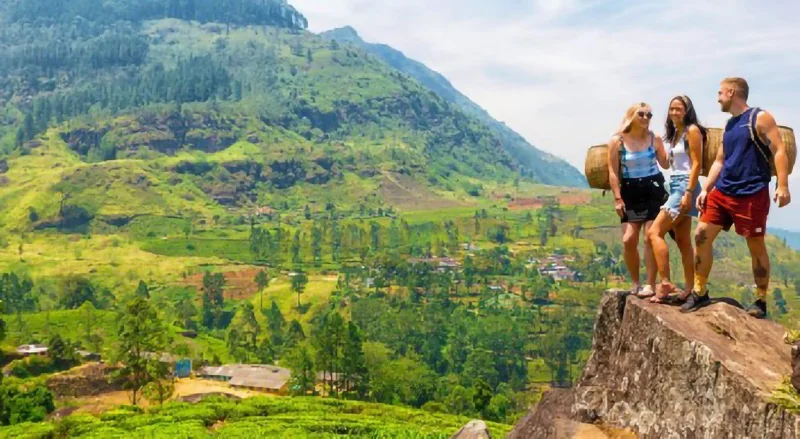
(Article 2 of the 4-part series on Sri Lanka’s tourism stagnation)
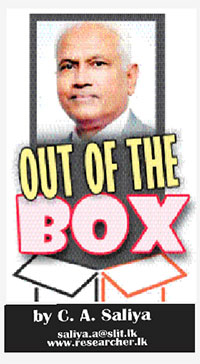 If Sri Lanka’s tourism story were a corporate income statement, the top line would satisfy any minister. Arrivals went up 15.1%, targets met, records broke. But walk down the statement and the story darkens. Revenue barely budges. Per-visitor yield collapses. The money that should accompany all those arrivals has quietly vanished, or, more accurately, never materialised.
If Sri Lanka’s tourism story were a corporate income statement, the top line would satisfy any minister. Arrivals went up 15.1%, targets met, records broke. But walk down the statement and the story darkens. Revenue barely budges. Per-visitor yield collapses. The money that should accompany all those arrivals has quietly vanished, or, more accurately, never materialised.
This is not a recovery. It is a volume trap, more tourists generating less wealth, with policymakers either oblivious to the math or unwilling to confront it.
Problem Diagnosis: The Paradox of Plenty:
The numbers tell a brutal story.
Read that again: arrivals grew 15.1% year-on-year, but revenue grew only 1.6%. The average tourist in 2025 left behind $181 less than in 2024, an 11.7% decline. Compared to 2018, the drop is even sharper. In real terms, adjusting for inflation and currency depreciation, each visitor in 2025 generates approximately 27-30% less revenue than in 2018, despite Sri Lanka being “cheaper” due to the rupee’s collapse. This is not marginal variance. This is structural value destruction. (See Table 1)

The math is simple and damning: Sri Lanka is working harder for less. More tourists, lower yield, thinner margins. Why? Because we have confused accessibility with competitiveness. We have made ourselves “affordable” through currency collapse and discounting, not through value creation.
Root Causes: The Five Mechanisms of Value Destruction
The yield collapse is not random. It is the predictable outcome of specific policy failures and market dynamics.
1. Currency Depreciation as False Competitiveness
The rupee’s collapse post-2022 has made Sri Lanka appear “cheap” to foreigners. A hotel room priced at $100 in 2018 might cost $70-80 in effective purchasing power today due to depreciation. Tour operators have aggressively discounted to fill capacity during the crisis recovery.
This creates the illusion of competitiveness. Arrivals rise because we are a “bargain.” But the bargain is paid for by domestic suppliers, hotels, transport providers, restaurants, staff, whose input costs (energy, food, imported goods) have skyrocketed in rupee terms while room rates lag in dollar terms.
The transfer is explicit: value flows from Sri Lankan workers and businesses to foreign tourists. The tourism “recovery” extracts wealth from the domestic economy rather than injecting it.
2. Market Composition Shift: Trading European Yields for Asian Volumes
SLTDA data shows a deliberate (or accidental—the policy opacity makes it unclear) shift in source markets. (See Table 2)

The problem is not that we attract Indians or Russians, it is that we attract them without strategies to optimise their yield. As the next article in this series will detail, Indian tourists average approximately 5.27 nights compared to the 8-9 night overall average, with lower per-day spending. We have built recovery on volume from price-sensitive segments rather than value from high-yield segments.
This is a choice, though it appears no one consciously made it. Visa-free entry, aggressive India-focused marketing, and price positioning have tilted the market mix without any apparent analysis of revenue implications.
3. Length of Stay Decline and Activity Compression
Average length of stay has compressed. While overall averages hover around 8-9 nights in recent years, the composition matters. High-yield European and North American tourists who historically spent 10-12 nights are now spending 7-9. Indian tourists spend 5-6 nights.
Shorter stays mean less cumulative spending, fewer experiences consumed, less distribution of value across the tourism chain. A 10-night tourist patronises multiple regions, hotels, guides, restaurants. A 5-night tourist concentrates spending in 2-3 locations, typically Colombo, one beach, one cultural site.
The compression is driven partly by global travel trends (shorter, more frequent trips) but also by Sri Lanka’s failure to develop compelling multi-day itineraries, adequate inter-regional connectivity, and differentiated regional experiences. We have not given tourists reasons to stay longer.
4. Infrastructure Decay and Experience Degradation
Tourists pay for experiences, not arrivals. When experiences degrade, airport congestion, poor road conditions, inadequate facilities at cultural sites, safety concerns, spending falls even if arrivals hold.
The 2024-2025 congestion at Bandaranaike International Airport, with reports of tourists nearly missing flights due to bottlenecks, is the visible tip. Beneath are systemic deficits: poor last-mile connectivity to tourism sites, deteriorating heritage assets, unregistered businesses providing sub-standard services, outbound migration of trained staff.
An ADB report notes that tourism authorities face resource shortages and capital expenditure embargoes, preventing even basic facility improvements at major revenue generators like Sigiriya (which charges $36 per visitor and attracts 25% of all tourists). When a site generates substantial revenue but lacks adequate lighting, safety measures, and visitor facilities, the experience suffers, and so does yield.
5. Leakage: The Silent Revenue Drain
Tourism revenue figures are gross. Net foreign exchange contributions after leakages, is rarely calculated or published.
Leakages include:
· Imported food, beverages, amenities in hotels (often 30-40% of operating costs)
· Foreign ownership and profit repatriation
· International tour operators taking commissions upstream (tourists book through foreign platforms that retain substantial margins)
· Unlicensed operators and unregulated businesses evading taxes and formal banking channels
Industry sources estimate leakages can consume 40-60% of gross tourism revenue in developing economies with weak regulatory enforcement. Sri Lanka has not published comprehensive leakage studies, but all indicators, weak licensing enforcement, widespread informal sector activity, foreign ownership concentration in resorts, suggest leakages are substantial and growing.
The result: even the $3.22 billion headline figure overstates actual net contribution to the economy.
The Way Forward: From Volume to Value
Reversing the yield collapse requires
systematic policy reorientation, from arrivals-chasing to value-building.
First
, publish and track yield metrics as primary KPIs. SLTDA should report:
· Revenue per visitor (by source market, by season, by purpose)
· Average daily expenditure (disaggregated by accommodation, activities, food, retail)
· Net foreign exchange contribution after documented leakages
· Revenue per room night (adjusted for real exchange rates)
Make these as visible as arrival numbers. Hold policy-makers accountable for yield, not just volume.
Second
, segment markets explicitly by yield potential. Stop treating all arrivals as equivalent. Conduct market-specific yield analyses:
· Which markets spend most per day?
· Which stays longest?
· Which distributes spending across regions vs. concentrating in Colombo/beach corridors?
· Which book is through formal channels vs. informal operators?
Target marketing and visa policies accordingly. If Western European tourists spend $250/day for 10 nights while another segment spends $120/day for 5 nights, the revenue difference ($2,500 vs. $600) dictates where promotional resources should flow.
Third
, develop multi-day, multi-region itineraries with compelling value propositions. Tourists extend stays when there are reasons to stay. Create integrated experiences:
· Cultural triangle + beach + hill country circuits with seamless connectivity
· Themed tours (wildlife, wellness, culinary, adventure) requiring 10+ days
· Regional spread of accommodation and experiences to distribute economic benefits
This requires infrastructure investment, precisely what has been neglected.
Fourth
, regulations to minimise leakages. Enforce licensing for tourism businesses. Channel bookings through formal operators registered with commercial banks. Tax holiday schemes should prioritise investments that maximise local value retention, staff training, local sourcing, domestic ownership.
Fifth
, stop using currency depreciation as a competitive strategy. A weak rupee makes Sri Lanka “affordable” but destroys margins and transfers wealth outward. Real competitiveness comes from differentiated experiences, quality standards, and strategic positioning, not from being the “cheapest” option.
The Hard Math: What We’re Losing
Let’s make the cost explicit. If Sri Lanka maintained 2018 per-visitor spending levels ($1,877) on 2025 arrivals (2.36 million), revenue would be approximately $4.43 billion, not $3.22 billion. The difference: $1.21 billion in lost revenue, value that should have been generated but wasn’t.
That $1.21 billion is not a theoretical gap. It represents:
· Wages not paid
· Businesses not sustained
· Taxes not collected
· Infrastructure not funded
· Development not achieved
This is the cost of volume-chasing without yield discipline. Every year we continue this model; we lock in value destruction.
The Policy Failure: Why Arrivals Theater Persists
Why do policymakers fixate on arrivals when revenue tells the real story?
Because arrivals are politically legible. A minister can tout “record tourist numbers” in a press conference. Revenue per visitor requires explanation, context, and uncomfortable questions about policy choices.
Arrivals are easy to manipulate upward, visa-free entry, aggressive discounting, currency depreciation. Yield is hard, it requires product development, market curation, infrastructure investment, regulatory enforcement.
Arrivals theater is cheaper and quicker than strategic transformation. But this is governance failure at its most fundamental. Tourism’s contribution to economic recovery is not determined by how many planes land but by how much wealth each visitor creates and retains domestically. Every dollar spent celebrating arrival records while ignoring yield collapse is a waste of dollars.
The Uncomfortable Truth
Sri Lanka’s tourism “boom” is real in volume, but it is a value bust. We are attracting more tourists and generating less wealth. The industry is working harder for lower returns. Margins are compressed, staff are paid less in real terms, infrastructure decays, and the net contribution to national recovery underperforms potential.
This is not sustainable. Eventually, operators will exit. Quality will degrade further. The “affordable” positioning will shift to “cheap and deteriorating.” The volume will follow yield down.
We have two choices: acknowledge the yield crisis and reorient policy toward value creation or continue arrivals theater until the hollowness becomes undeniable.
The money has spoken. The question is whether anyone in power is listening.
Features
Misinterpreting President Dissanayake on National Reconciliation
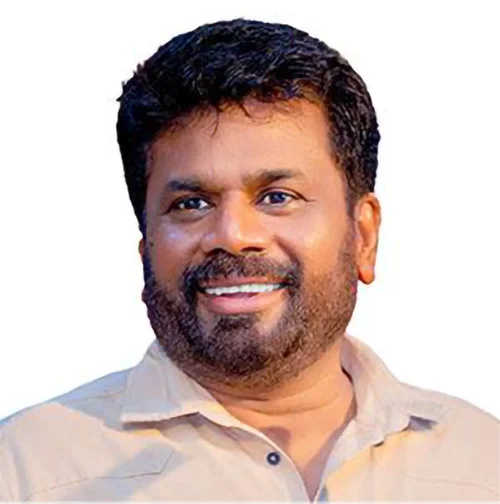
President Anura Kumara Dissanayake has been investing his political capital in going to the public to explain some of the most politically sensitive and controversial issues. At a time when easier political choices are available, the president is choosing the harder path of confronting ethnic suspicion and communal fears. There are three issues in particular on which the president’s words have generated strong reactions. These are first with regard to Buddhist pilgrims going to the north of the country with nationalist motivations. Second is the controversy relating to the expansion of the Tissa Raja Maha Viharaya, a recently constructed Buddhist temple in Kankesanturai which has become a flashpoint between local Tamil residents and Sinhala nationalist groups. Third is the decision not to give the war victory a central place in the Independence Day celebrations.
Even in the opposition, when his party held only three seats in parliament, Anura Kumara Dissanayake took his role as a public educator seriously. He used to deliver lengthy, well researched and easily digestible speeches in parliament. He continues this practice as president. It can be seen that his statements are primarily meant to elevate the thinking of the people and not to win votes the easy way. The easy way to win votes whether in Sri Lanka or elsewhere in the world is to rouse nationalist and racist sentiments and ride that wave. Sri Lanka’s post independence political history shows that narrow ethnic mobilisation has often produced short term electoral gains but long term national damage.
Sections of the opposition and segments of the general public have been critical of the president for taking these positions. They have claimed that the president is taking these positions in order to obtain more Tamil votes or to appease minority communities. The same may be said in reverse of those others who take contrary positions that they seek the Sinhala votes. These political actors who thrive on nationalist mobilisation have attempted to portray the president’s statements as an abandonment of the majority community. The president’s actions need to be understood within the larger framework of national reconciliation and long term national stability.
Reconciler’s Duty
When the president referred to Buddhist pilgrims from the south going to the north, he was not speaking about pilgrims visiting long established Buddhist heritage sites such as Nagadeepa or Kandarodai. His remarks were directed at a specific and highly contentious development, the recently built Buddhist temple in Kankesanturai and those built elsewhere in the recent past in the north and east. The temple in Kankesanturai did not emerge from the religious needs of a local Buddhist community as there is none in that area. It has been constructed on land that was formerly owned and used by Tamil civilians and which came under military occupation as a high security zone. What has made the issue of the temple particularly controversial is that it was established with the support of the security forces.
The controversy has deepened because the temple authorities have sought to expand the site from approximately one acre to nearly fourteen acres on the basis that there was a historic Buddhist temple in that area up to the colonial period. However, the Tamil residents of the area fear that expansion would further displace surrounding residents and consolidate a permanent Buddhist religious presence in the present period in an area where the local population is overwhelmingly Hindu. For many Tamils in Kankesanturai, the issue is not Buddhism as a religion but the use of religion as a vehicle for territorial assertion and demographic changes in a region that bore the brunt of the war. Likewise, there are other parts of the north and east where other temples or places of worship have been established by the military personnel in their camps during their war-time occupation and questions arise regarding the future when these camps are finally closed.
There are those who have actively organised large scale pilgrimages from the south to make the Tissa temple another important religious site. These pilgrimages are framed publicly as acts of devotion but are widely perceived locally as demonstrations of dominance. Each such visit heightens tension, provokes protest by Tamil residents, and risks confrontation. For communities that experienced mass displacement, military occupation and land loss, the symbolism of a state backed religious structure on contested land with the backing of the security forces is impossible to separate from memories of war and destruction. A president committed to reconciliation cannot remain silent in the face of such provocations, however uncomfortable it may be to challenge sections of the majority community.
High-minded leadership
The controversy regarding the president’s Independence Day speech has also generated strong debate. In that speech the president did not refer to the military victory over the LTTE and also did not use the term “war heroes” to describe soldiers. For many Sinhala nationalist groups, the absence of these references was seen as an attempt to diminish the sacrifices of the armed forces. The reality is that Independence Day means very different things to different communities. In the north and east the same day is marked by protest events and mourning and as a “Black Day”, symbolising the consolidation of a state they continue to experience as excluding them and not empathizing with the full extent of their losses.
By way of contrast, the president’s objective was to ensure that Independence Day could be observed as a day that belonged to all communities in the country. It is not correct to assume that the president takes these positions in order to appease minorities or secure electoral advantage. The president is only one year into his term and does not need to take politically risky positions for short term electoral gains. Indeed, the positions he has taken involve confronting powerful nationalist political forces that can mobilise significant opposition. He risks losing majority support for his statements. This itself indicates that the motivation is not electoral calculation.
President Dissanayake has recognized that Sri Lanka’s long term political stability and economic recovery depend on building trust among communities that once peacefully coexisted and then lived through decades of war. Political leadership is ultimately tested by the willingness to say what is necessary rather than what is politically expedient. The president’s recent interventions demonstrate rare national leadership and constitute an attempt to shift public discourse away from ethnic triumphalism and toward a more inclusive conception of nationhood. Reconciliation cannot take root if national ceremonies reinforce the perception of victory for one community and defeat for another especially in an internal conflict.
BY Jehan Perera
Features
Recovery of LTTE weapons
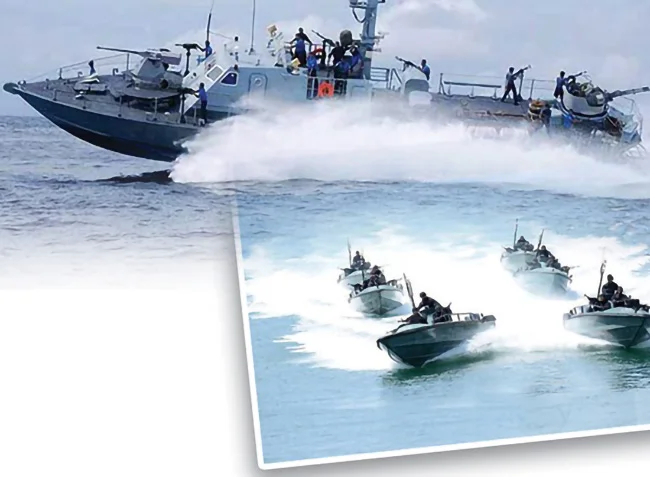
I have read a newspaper report that the Special Task Force of Sri Lanka Police, with help of Military Intelligence, recovered three buried yet well-preserved 84mm Carl Gustaf recoilless rocket launchers used by the LTTE, in the Kudumbimalai area, Batticaloa.
These deadly weapons were used by the LTTE SEA TIGER WING to attack the Sri Lanka Navy ships and craft in 1990s. The first incident was in February 1997, off Iranativu island, in the Gulf of Mannar.
Admiral Cecil Tissera took over as Commander of the Navy on 27 January, 1997, from Admiral Mohan Samarasekara.
The fight against the LTTE was intensified from 1996 and the SLN was using her Vanguard of the Navy, Fast Attack Craft Squadron, to destroy the LTTE’s littoral fighting capabilities. Frequent confrontations against the LTTE Sea Tiger boats were reported off Mullaitivu, Point Pedro and Velvetiturai areas, where SLN units became victorious in most of these sea battles, except in a few incidents where the SLN lost Fast Attack Craft.

Carl Gustaf recoilless rocket launchers
The intelligence reports confirmed that the LTTE Sea Tigers was using new recoilless rocket launchers against aluminium-hull FACs, and they were deadly at close quarter sea battles, but the exact type of this weapon was not disclosed.
The following incident, which occurred in February 1997, helped confirm the weapon was Carl Gustaf 84 mm Recoilless gun!
DATE: 09TH FEBRUARY, 1997, morning 0600 hrs.
LOCATION: OFF IRANATHIVE.
FACs: P 460 ISRAEL BUILT, COMMANDED BY CDR MANOJ JAYESOORIYA
P 452 CDL BUILT, COMMANDED BY LCDR PM WICKRAMASINGHE (ON TEMPORARY COMMAND. PROPER OIC LCDR N HEENATIGALA)
OPERATED FROM KKS.
CONFRONTED WITH LTTE ATTACK CRAFT POWERED WITH FOUR 250 HP OUT BOARD MOTORS.
TARGET WAS DESTROYED AND ONE LTTE MEMBER WAS CAPTURED.
LEADING MARINE ENGINEERING MECHANIC OF THE FAC CAME UP TO THE BRIDGE CARRYING A PROJECTILE WHICH WAS FIRED BY THE LTTE BOAT, DURING CONFRONTATION, WHICH PENETRATED THROUGH THE FAC’s HULL, AND ENTERED THE OICs CABIN (BETWEEN THE TWO BUNKS) AND HIT THE AUXILIARY ENGINE ROOM DOOR AND HAD FALLEN DOWN WITHOUT EXPLODING. THE ENGINE ROOM DOOR WAS HEAVILY DAMAGED LOOSING THE WATER TIGHT INTEGRITY OF THE FAC.
THE PROJECTILE WAS LATER HANDED OVER TO THE NAVAL WEAPONS EXPERTS WHEN THE FACs RETURNED TO KKS. INVESTIGATIONS REVEALED THE WEAPON USED BY THE ENEMY WAS 84 mm CARL GUSTAF SHOULDER-FIRED RECOILLESS GUN AND THIS PROJECTILE WAS AN ILLUMINATER BOMB OF ONE MILLION CANDLE POWER. BUT THE ATTACKERS HAS FAILED TO REMOVE THE SAFETY PIN, THEREFORE THE BOMB WAS NOT ACTIVATED.
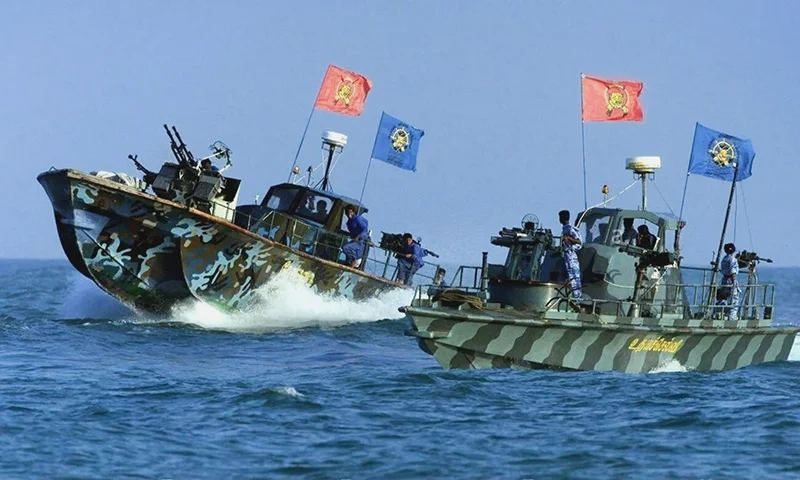
Sea Tigers
Carl Gustaf 84 mm recoilless gun was named after Carl Gustaf Stads Gevärsfaktori, which, initially, produced it. Sweden later developed the 84mm shoulder-fired recoilless gun by the Royal Swedish Army Materiel Administration during the second half of 1940s as a crew served man- portable infantry support gun for close range multi-role anti-armour, anti-personnel, battle field illumination, smoke screening and marking fire.
It is confirmed in Wikipedia that Carl Gustaf Recoilless shoulder-fired guns were used by the only non-state actor in the world – the LTTE – during the final Eelam War.
It is extremely important to check the batch numbers of the recently recovered three launchers to find out where they were produced and other details like how they ended up in Batticaloa, Sri Lanka?
 By Admiral Ravindra C. Wijegunaratne
By Admiral Ravindra C. Wijegunaratne
WV, RWP and Bar, RSP, VSV, USP, NI (M) (Pakistan), ndc, psn, Bsc (Hons) (War Studies) (Karachi) MPhil (Madras)
Former Navy Commander and Former Chief of Defence Staff
Former Chairman, Trincomalee Petroleum Terminals Ltd
Former Managing Director Ceylon Petroleum Corporation
Former High Commissioner to Pakistan
-

 Features4 days ago
Features4 days agoMy experience in turning around the Merchant Bank of Sri Lanka (MBSL) – Episode 3
-

 Business5 days ago
Business5 days agoZone24x7 enters 2026 with strong momentum, reinforcing its role as an enterprise AI and automation partner
-

 Business4 days ago
Business4 days agoRemotely conducted Business Forum in Paris attracts reputed French companies
-

 Business4 days ago
Business4 days agoFour runs, a thousand dreams: How a small-town school bowled its way into the record books
-

 Business4 days ago
Business4 days agoComBank and Hayleys Mobility redefine sustainable mobility with flexible leasing solutions
-

 Business5 days ago
Business5 days agoHNB recognized among Top 10 Best Employers of 2025 at the EFC National Best Employer Awards
-

 Editorial7 days ago
Editorial7 days agoAll’s not well that ends well?
-

 Business5 days ago
Business5 days agoGREAT 2025–2030: Sri Lanka’s Green ambition meets a grid reality check












